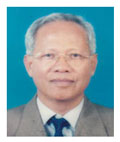IPA Training is Registered with

Learn from the Best
 HJ. ROZALI BIN AYED has over 49 years of field experience in electrical engineering, and he currently serves as Technical Director for Karo Engineering Services specialized in installation, testing and maintenance of electrical installation. Throughout his 49 years of careers in the field of electrical engineering, he has held numerous positions such as Senior Chargeman, Senior Technician, Foremen, Assistant Engineer, Project Manager, Facility Manager, Consultant Engineer, Technical Advisor, and has served for both the public (Jabatan Kerja Raya Malaysia) and private sectors.
HJ. ROZALI BIN AYED has over 49 years of field experience in electrical engineering, and he currently serves as Technical Director for Karo Engineering Services specialized in installation, testing and maintenance of electrical installation. Throughout his 49 years of careers in the field of electrical engineering, he has held numerous positions such as Senior Chargeman, Senior Technician, Foremen, Assistant Engineer, Project Manager, Facility Manager, Consultant Engineer, Technical Advisor, and has served for both the public (Jabatan Kerja Raya Malaysia) and private sectors.
He also possesses a great wealth of experience in teaching, lecturing, consulting for over 38 years, and he is currently engaged with the Construction Industrial Development Board of Malaysia (CIDB) as a Valuation Officer for the Site Supervisory Certifications in electrical construction works. In addition he is officially recognized as Train the Trainer (TTT) awarded by Pusat Sumber Manusia Berhad (PSMB).
He has also passed special government examination to be qualified as Assistant Electrical Engineer, holder of Diploma Skills Malaysia in the field of “Electrical Technology” awarded by Jabatan Pembangunan Kemahiran Malaysia/Kementerian Sumber Manusia Malaysia. Holder of Professional Certification as Competent Electrical Engineer (supervisory), Competencies certifications as Chargeman Category B4 – 33kV and Wireman Category PW4 Three-Phase Testing and Endorsement awarded by Energy Commission of Malaysia. He has successfully attended Technical and Industrial Training organized by the Association of Overseas Technical Scholarship (AOTS), at NEC Corporation Tokyo, Japan (1984-1985), successfully attended User Training in Energy Management System (EnMS) – ISO 50001, and User Training in Fan Systems Optimization held in the year 2012 organized by Industrial Energy Efficiency for Malaysia Manufacturing Sector and collaborated with the United Nation Industrial Development Organization (UNIDO).
Venue Details
Hotel Istana
73 Jalan Raja Chulan,
- 50200
Phone : 03 2141 9988
Fax : 03 2144 0111
Contact us
Juliany,
03 2283 6109
juliany@ipa.com.my
Phoebe,
03 2283 6100
phoebe@ipa.com.my
FOR CUSTOMISED IN-HOUSE TRAINING
Jane,
03 2283 6101
Jane@ipa.com.my
ADDRESS
A-28-5, 28th Floor, Menara UOA Bangsar,
No.5, Jalan Bangsar Utama 1,
59000 Kuala Lumpur
www.ipa.com.my
|
|
